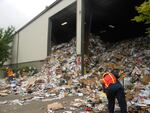Oregon lawmakers are considering two bills that aim to overhaul the state’s recycling system by requiring packaging companies to take responsibility for their products.
Both bills would create a statewide list of what is recyclable in curbside bins, and both would ban the use of the chasing arrows recycling symbol on packaging that isn’t actually recyclable.
House Bill 2065 came out of a two-year recycling stakeholder committee process led by the Oregon Department of Environmental Quality. Gov. Kate Brown is backing that bill, which calls for packaging companies to share the cost of recycling with governments and consumers. It would require companies that produce packaging, paper and disposable food service ware to form a producer responsibility organization that would develop a plan for recycling all of the items on the statewide collection list and meeting a yet-to-be-determined goal for plastic recycling.
The organization would collect fees that would be used to pay for collection, processing, transportation and disposal of packaging material, consumer outreach and education and reimbursing state and governments for recycling costs as needed. The fee structure would be designed to incentivize companies to make packaging that is easy to recycle and causes minimal environmental impacts.

At least 2.5 percent of the material collected from curbside recycling bins will end up going to a landfill after it leaves the Far West Fibers recycling facility.
Amanda Troxler / OPB
“Overall, we want to make the recycling system easier to use, more accessible to people across the state and more equitable in how it distributes benefits and burdens,” Sanne Stienstra, natural resource specialist with DEQ, said. “And we also want to make sure that we what we collect for recycling is actually recycled in a responsible way. The system we have now was created decades ago, and it wasn’t built for what we put in the bin today.”
Rep. Janeen Sollman, D-Hillsboro, is sponsoring a similar bill, House Bill 2592, which would follow a similar structure but require packaging producers to pay for more of the state’s recycling system to incentivize them to change their packaging and reduce waste.
“To create that incentive, producers are responsible for all waste costs associated with their products, including waste collection, transportation and management, and litter cleanup costs,” Sollman said on a press call Monday. “Making producers responsible for waste is an important step toward a circular economy.”
Sollman’s bill also sets specific requirements for recycling and reusing rigid and flexible plastic, glass, aluminum, steel and paper packaging. For example, it requires 60% of rigid plastic covered by the new program to be recycled or reused by 2030. It also sets requirements for how much recycled material needs to be used in future packaging.
Sen. Lee Beyer, D-Springfield, is also sponsoring Senate Bill 14, which would create a stewardship program just for plastic packaging and plastic food service ware.
Oregon is one of nine states where lawmakers have proposed extended producer responsibility laws for packaging. State legislatures in Washington, New York, California, Vermont, New Hampshire, Maryland, Hawaii and Colorado are all considering similar bills that require companies that make packaging to pay for its recycling and disposal.
Ameripen Executive Director Dan Felton, who represents dozens of companies throughout the packaging supply chain — from Dow Chemical to PepsiCo to Waste Management — said his group has been involved in ongoing discussions with DEQ about the state’s extended producer responsibility plan, but it hasn’t taken a position on the resulting bill yet.
“We have some concerns with the bill as it was introduced,” Felton said. “It’s better than some of the other proposals we’ve seen in some of the other states, but I will say there’s also a whole lot of prescriptiveness to it.”
Felton said his group wants to make sure the producer responsibility organization has enough control over the funds it collects from its members because the state bill creates an advisory board and gives authority to DEQ and the Environmental Quality Commission to oversee the producers and reject their proposals. He said extended producer responsibility programs could help companies meet their goals for recycled content in their packaging, but there are certain things the industry doesn’t want to pay for — like disposing of trash in landfills.
“That’s a tough pill for the industry to swallow,” he said. “It’s just not something we’re going to agree to.”
DEQ staff is still analyzing how much its proposed producer responsibility program will cost packaging companies. State officials say Oregon’s recycling reforms would end up costing packaging companies tens of millions of dollars, and it’s unclear whether those costs would be passed on to consumers in some form.
